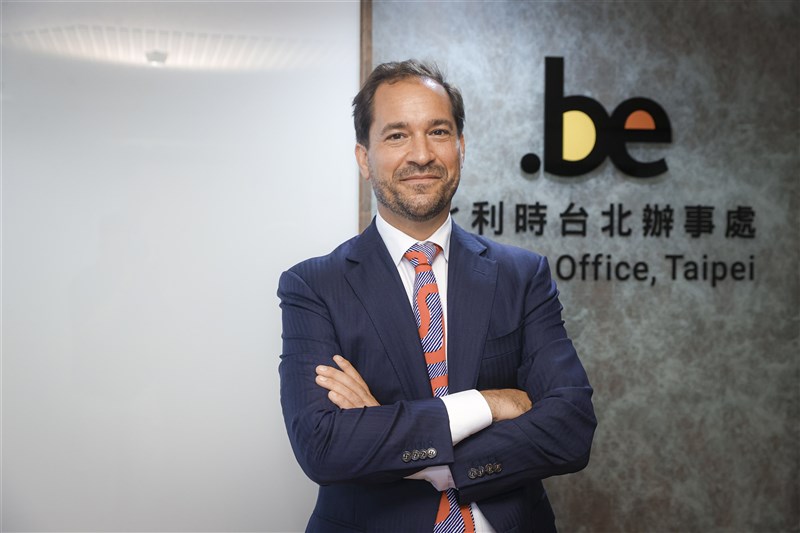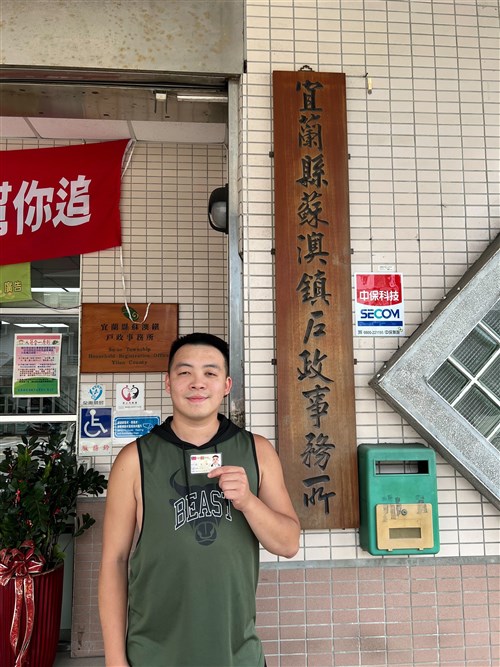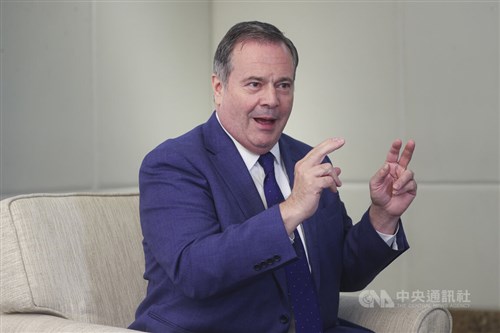INTERVIEW/Belgian envoy urges deeper ties in semiconductors, energy transition

Taipei, July 18 (CNA) Belgium's representative to Taiwan, Matthieu Baudouin A. Branders, has called for closer cooperation with Taiwan in developing talent for the semiconductor industry and highlighted growing opportunities in the clean energy sector.
Speaking in an interview with CNA Thursday, Branders said relations between Belgium and Taiwan have been strong over the years, particularly in the areas of technology, trade and energy.
Belgium and Taiwan are collaborating "on so many sectors of the future -- not only semiconductors, but also life sciences, energy," he said. "It's very interesting to see that we are really facing the same challenges and addressing them together."
The representative described the semiconductor partnership between Taiwan and Belgium -- particularly the collaboration between Taiwan's National Science and Technology Council (NSTC) and Belgium's Interuniversity Microelectronics Centre (IMEC) -- as a cornerstone of bilateral relations.
Founded in 1984 in Belgium, IMEC is an international research and development organization that specializes in nanoelectronics and digital technologies, and currently conducts joint research projects with leading Taiwanese institutions and companies.
According to the representative, Belgium and Taiwan both made a "crazy bet" in the 1980s to develop semiconductors amid the decline of traditional industries, and both have maintained a competitive edge in the sector.
Such cooperation is even more crucial as the European Union has identified chips as strategic assets and pledged to double the bloc's share of global semiconductor manufacturing from the current 10 percent to 20 percent by 2030.
"Economic security has become a major theme ... it's essential to be able to build [a] certain level of strategic autonomy," he said.
Going forward, Branders said Taiwan and Belgium could collaborate on talent incubation, as the European Union pushes to scale up its chip development and manufacturing capacity to strengthen its goal of achieving "technology sovereignty."
"[The] challenge that we face in Belgium, Europe and Taiwan is the talent," Branders said, noting that "I think [this is] where the [bilateral] relationship could evolve."
He said approximately 500 Taiwanese go to Belgium every year for studies or research, and around half study or specialize in electrical engineering.
Beyond semiconductors, Belgium is positioning itself as a key partner for Taiwan in energy transition.
Despite Belgium's recent policy shift on the use of nuclear energy, the country continues to develop alternative sources, he said, particularly in offshore wind energy and hydrogen power.
Hydrogen is "certainly a subject where we have expertise and where there could be room for collaboration," he said.
In May, the Belgian parliament revoked the 2003 legislation that established the goal of phasing out nuclear energy and banned any new nuclear power facilities, citing the need to ensure energy security and achieve decarbonization.
Branders has served as head of the Belgian Office, Taipei -- which represents the European nation's interests in Taiwan in the absence of diplomatic relations -- since August 2023.
He has previously been posted to Japan, Singapore and Brazil.
![Protester to soldier: Hongkonger finds road to Taiwan citizenship bumpy]() Protester to soldier: Hongkonger finds road to Taiwan citizenship bumpyIvan Choi (蔡智豪) was forced into exile after playing an active role on the front lines of Hong Kong's 2019 mass protests.08/22/2025 04:27 PM
Protester to soldier: Hongkonger finds road to Taiwan citizenship bumpyIvan Choi (蔡智豪) was forced into exile after playing an active role on the front lines of Hong Kong's 2019 mass protests.08/22/2025 04:27 PM![Taiwanese American puts groovy spins on classic Hokkien songs]() Taiwanese American puts groovy spins on classic Hokkien songsTo Shinyi Lee (李欣怡), Hokkien Taiwanese music needed an overhaul. Seeing the genre as dominated by "khàu-tiāu-á" (哭調仔, "crying songs") and lacking grooves, she set out to change it by putting her own spin on traditional Taiwanese songs.08/18/2025 07:47 PM
Taiwanese American puts groovy spins on classic Hokkien songsTo Shinyi Lee (李欣怡), Hokkien Taiwanese music needed an overhaul. Seeing the genre as dominated by "khàu-tiāu-á" (哭調仔, "crying songs") and lacking grooves, she set out to change it by putting her own spin on traditional Taiwanese songs.08/18/2025 07:47 PM![Taiwan should spend more on defense: Ex-Canada defense head]() Taiwan should spend more on defense: Ex-Canada defense headA former Canadian defense chief has advised Taiwan to raise its defense spending in the face of growing military threats from China to show it is determined to defend itself instead of solely relying on the United States' support.08/06/2025 11:31 AM
Taiwan should spend more on defense: Ex-Canada defense headA former Canadian defense chief has advised Taiwan to raise its defense spending in the face of growing military threats from China to show it is determined to defend itself instead of solely relying on the United States' support.08/06/2025 11:31 AM
- Politics
Lawmakers back defense budget hike in meeting with U.S. senators
08/30/2025 09:18 PM - Culture
Taiwanese Indigenous musicians make Moscow debut
08/30/2025 06:05 PM - Society
Kuo-Kuang bus to make final trip in 6 southern routes on Saturday
08/30/2025 05:39 PM - Politics
TPP supporters clash with police at rally over Ko Wen-je's legal case
08/30/2025 04:59 PM - Business
Taiwan ranks No. 3 in ratio of R&D spending to GDP in 2023
08/30/2025 04:59 PM


